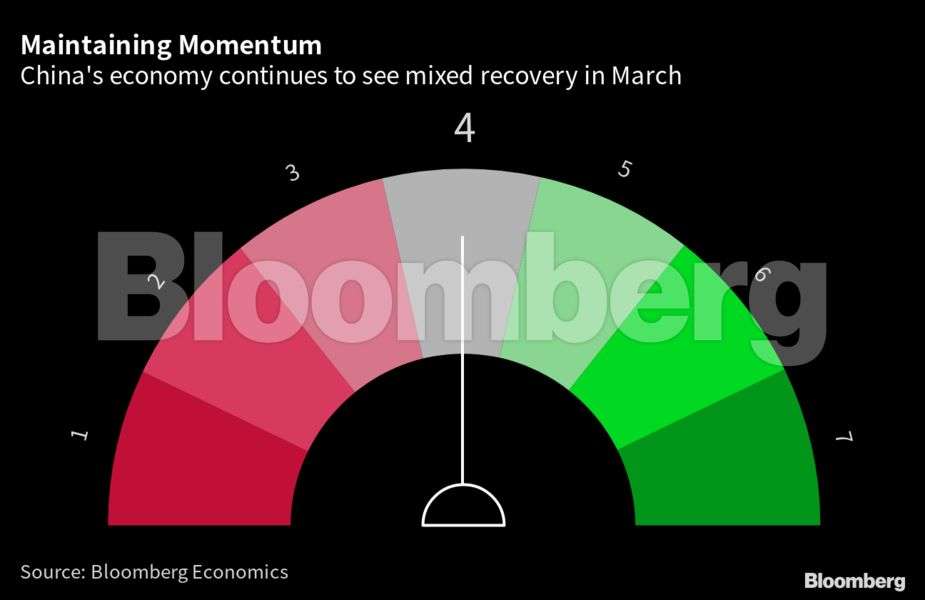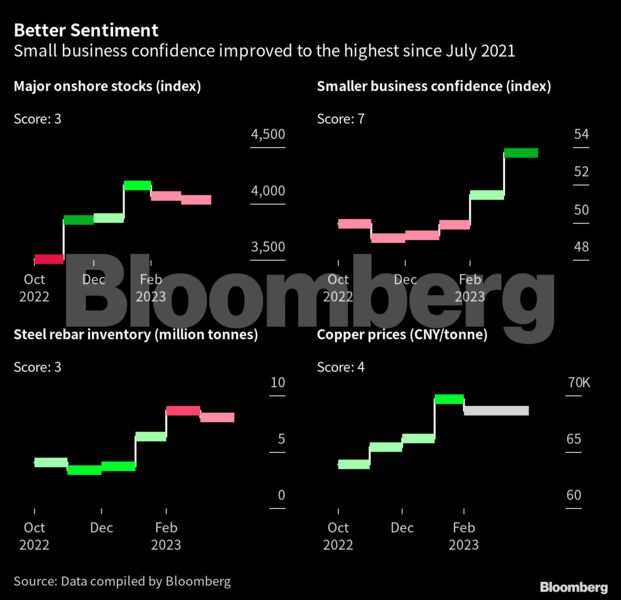Bloomberg’s latest aggregate index of eight early indicators showed growth momentum steadied from February, with the overall gauge remaining at 4. Falling car sales and weak global demand were the main drags on the index.
 Bloomberg
BloombergChina’s reopening after three years of strict pandemic rules has boosted confidence, with consumers once again filling up restaurants and subways, and businesses returning to normal. The housing market slump, which has been a major drag on the economy, is also showing signs of bottoming out as home sales and prices rebounded recently.
The global environment remains uncertain, though, with central banks continuing to hike interest rates to curb inflation and a banking crisis fueling investor concern. A weakening global economy means a further slump in demand for Chinese exports, which have already plummeted in recent months.
 Bloomberg
BloombergEconomists are betting the recovery in consumer spending will underpin China’s growth this year, which is expected to now reach 5.3% this year, according to the latest survey by Bloomberg, up from a previous forecast of 5.2%.
Growth in the second quarter is forecast to accelerate to 7.3%, which would be the fastest pace in two years, according to the survey, largely due to a lower base of comparison from last year.In March, confidence among small businesses climbed to the highest level since July 2021, according to a survey from Standard Chartered Plc. In the services sector, sentiment among real estate, financial and IT businesses improved sharply, the bank said.
For catering and accommodation businesses, confidence fell after a post-reopening spending boom eased.
 Bloomberg
BloombergSeveral indicators pointed to weakness in the economy. Early trade data from South Korea — a barometer for global demand — showed a deepening slump in exports, with shipments plunging 23.1% on average in the first 20 days of March from a year earlier.
China’s vehicle sales continued to contract in March from a year earlier, according to weekly data from the China Passenger Car Association.
Steel inventories also steadily increased in March, an ominous sign for demand. That’s even as output volumes increase to meet construction demand before a likely government-mandated cut in nationwide production of the alloy for environmental reasons.
Early Indicators
Bloomberg Economics generates the overall activity reading by aggregating a three-month weighted average of the monthly changes of eight indicators, which are based on business surveys or market prices.
- Major onshore stocks – CSI 300 index of A-share stocks listed in Shanghai or Shenzhen (through market close on the 25th of the month).
- Total floor area of home sales in China’s four Tier-1 cities (Beijing, Shanghai, Guangzhou and Shenzhen).
- Inventory of steel rebar, used for reinforcing in construction (in 10,000 metric tons). Falling inventory is a sign of rising demand.
- Copper prices – Spot price for refined copper in Shanghai market (yuan/metric ton).
- South Korean exports – South Korean exports in the first 20 days of each month (year-on-year change).
- Factory inflation tracker – Bloomberg Economics-created tracker for Chinese producer prices (year-on-year change).
- Small and medium-sized business confidence – Survey of companies conducted by Standard Chartered.
- Passenger car sales – Monthly result calculated from the weekly average sales data released by the China Passenger Car Association.










